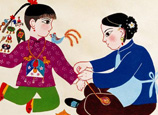
You are "out" if you do not know about "Oppan Gangnam style." It is the refrain of South Korean rapper PSY's global hit single "Gangnam Style." Even famous tennis player Novak Djokovic celebrated his recent China Open title by performing the distinctive horse-riding dance in the song's music video. "Gangnam Style" hit the number one spot in many countries such as Australia, Belgium, Canada, Denmark, and Finland, and broke the world record for "most liked" YouTube video. The song is also extremely popular in China, and various parodies made by Chinese high school and university students have mushroomed on the Internet
However, there are some criticisms of the incredibly popular K-pop single. The other day, a Chinese artist complained that most people could not appreciate the beauty of such elegant art forms as Peking Opera and Kunqu Opera, but admires a vulgar song by a foreign singer. He just cannot understand it, and there must be lots of people who think the same.
It is not bad for a song and dance to enjoy great popularity as long as they do not violate the law. After all, works of art need audiences, in addition to conveying artists' feelings. There are vulgar and elegant art forms according to different tastes, but there is no such thing as bad art. Furthermore, it is one's freedom to like any art form, and other people cannot judge him or her according to their own preferences. Restricting all "vulgar" art forms is not only unreasonable, but also harmful to the development of cultural and arts development.
The relations between so-called vulgar and elegant art forms are not as simple as many believe. Vulgarity and elegance are relative concepts. Ci, a popular poetic form during the Song dynasty, was "vulgar" compared with Tang poetry, but "elegant" compared with Yuan dynasty drama, a popular poetic form during the Yuan dynasty. Ci and Tang poetry were "elegant" compared with novels written in the Ming and Qing dynasties, while folk songs are always "vulgar." There have been some particularly vulgar folk songs during all dynasties, but that does not affect the vitality of folk songs as a whole.
At present, novels are almost "elegant" compared with movies, television series, and Internet videos. Peking Opera and all art forms of Quyi used to be considered extremely "vulgar," but have become elegant art that needs to be rescued. Movies were an artistic symbol of the modern industrial society's popular culture when they first appeared, but are now often considered "elegant" compared with television series. Vulgarity and elegance can totally coexist. There is Madonna and the Boston Symphony Orchestra in the United States, which has high levels of both "vulgar" and "elegant" cultures.
However, tolerance of "vulgar culture" does not equate with advocacy of coarseness and low tastes. Even "vulgarity" has different levels. Jin Yong and Gu Long are masters of "vulgar culture" and art geniuses. There are too much coarseness and too many low tastes in domestic cultural circles mainly because of the lack of true singers, actors, writers, and artists.
People should neither blindly praise nor deeply grieve over the great popularity of "vulgar culture." If an artist was once greatly admired for his "elegant" works, he or she should not envy or hate others for their popular "vulgar" works, denounce the public for ignoring elegant art, or even go as far as saying that national culture is on the edge of a cliff.
Cultures, particularly aesthetic cultures and art forms, have their own beauty and values. As an old saying goes, "One man's meat is another man's poison." Just because you like spicy Sichuan food and Peking Opera does not mean others have to like the same things. If all people think the same and have the same preferences, the cultural ecosystem of mankind will die sooner or later.
Source:Worker's Daily, author: Xiao Han.














 Record number of hopefuls sit annual civil service exam
Record number of hopefuls sit annual civil service exam


![]()
